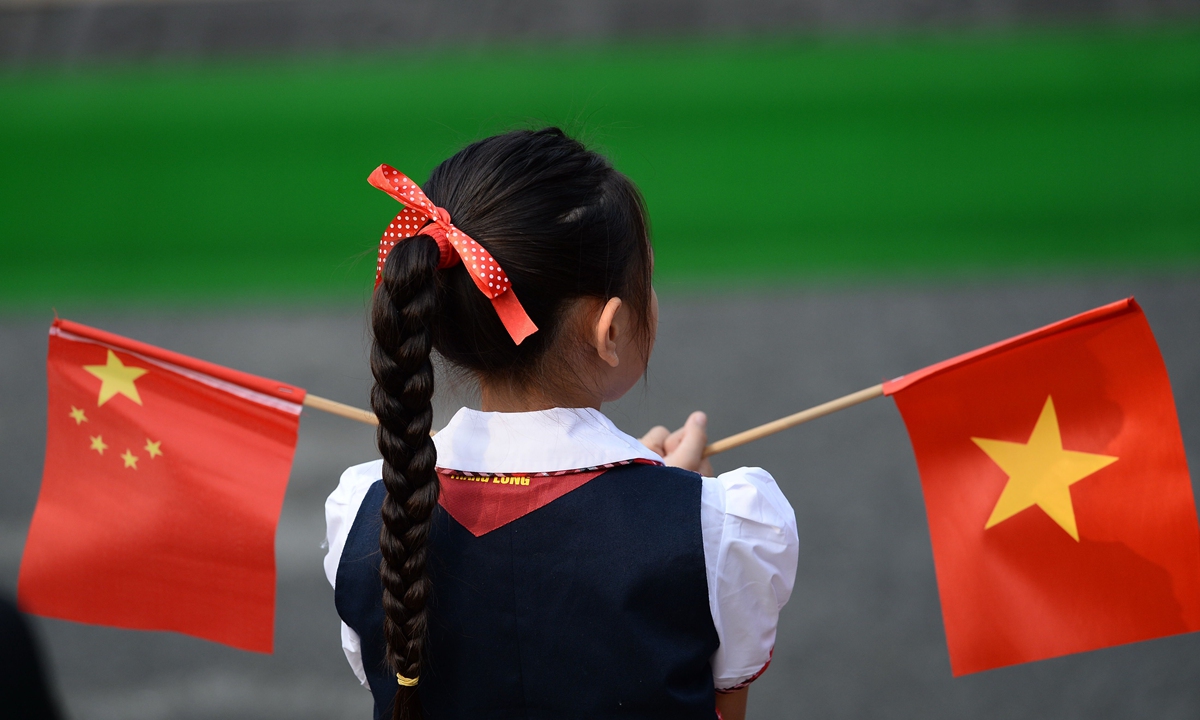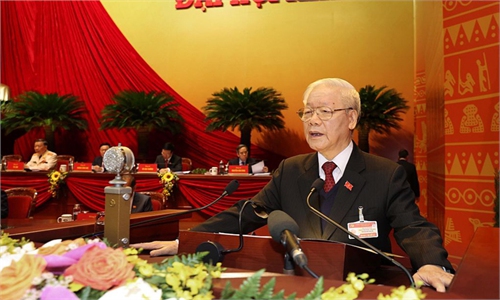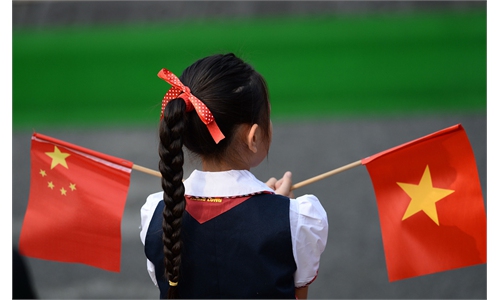Vietnam’s Trong visit shows cooperation among socialist countries is vital when West plays up ideological propaganda

A Vietnamese pupil holds Vietnamese and Chinese national flags. Photo: VCG
General Secretary of the Communist Party of Vietnam (CPV) Central Committee Nguyen Phu Trong will pay an official visit to China from Sunday to Wednesday at the invitation of Xi Jinping, general secretary of the Communist Party of China (CPC) Central Committee and Chinese president.Trong will be the first foreign leader to pay an official visit to China by invitation following the conclusion of the 20th CPC National Congress. It should be noted that the destination of Xi's first visit after the 19th CPC National Congress was Vietnam.
China and Vietnam are adjacent to each other by land and sea, with close historical interactions and highly similar cultures, and both are socialist countries led by the Communist Party. As a result, in addition to being good neighbors and partners, the two countries also have traditional friendship of "comrades and brothers."
For China and Vietnam, inter-party relations are of special significance, because both countries are not only socialist countries, but also have gone through a similar path in the socialist revolution and construction, in which they have helped and supported each other and learned experience from each other. Once some twists and turns took place in the relationship between the two countries, inter-party exchanges often played a big role of communication and coordination, adding more stability to the development of the ties between the two countries.
Great power competition has triggered more uncertainties in Southeast Asia. The US has ramped up its focus on the Indo-Pacific region, seeking to contain China by roping in regional countries. Western countries have repeatedly played up so-called "democracy versus autocracy" confrontation, launching a fresh round of ideological attacks on socialist countries. Furthermore, when global economic recovery is sluggish in the context of the ongoing pandemic, it is vital for the two countries to cooperate in jointly maintaining regional industrial and supply chains. Against these backdrops, the relations between the two parties and the two countries of China and Vietnam are crucial.
Trong's visit will once again clearly illustrate that Vietnam will not stand on the side of the US in the major power game. In fact, Vietnam has publicly expressed its support for socialism with Chinese characteristics regardless of Washington's pressure. After the visit, the two countries may launch further measures on how to strengthen communication and deepen cooperation, so as to promote the two countries to consolidate cooperative relations under the complex global situation.
As a significant country in Southeast Asia and a key player in the South China Sea, Hanoi's China policy is conducive to stabilizing the situation in the South China Sea, as well as promoting other Southeast Asian countries to have a better understanding of the regional situation and pushing the ASEAN to be friendly to China.
It can be anticipated that Washington will not discard its attempts to woo Vietnam, in a bid to contain China. However, the scope of the US' leverage is highly limited, and it remains unclear how much benefit the Indo-Pacific Economic Framework for Prosperity can offer to its members, including Vietnam. When strengthening military and security cooperation with the US, Vietnam will also take China's feeling and stance into account. Furthermore, with different ideologies, the Vietnamese government has always been very vigilant about the US' scheme of peaceful evolution.
Generally, Southeast Asian countries see a clear picture of the situation between China and the US and have repeatedly expressed their stance of not taking sides. It is expected that there will be no major changes in ASEAN countries' policies toward China and the US in the near future.
"Trong's visit reflected the two parties' [CPC and CPV] ideological solidarity and affinity," the South China Morning Post cited Kalvin Fung Ka-shing, international relations researcher at Waseda University in Tokyo. Such a view makes sense.
Recently, the US and the West have been intensifying their attempts in ideological propaganda in criticizing those countries whose political systems differ from theirs.
In the face of the West's values-based diplomacy, it is normal for socialist countries to strengthen their cooperation. Mutual solidarity in public opinion, bilateral exchanges in governance, and mutual support will help these countries in maintaining firm determination to follow the socialist path that suits their national conditions and safeguarding their common interests on the world stage.
It is important to note that cooperation among socialist countries fundamentally differs from the "Summit for Democracy" initiated by the West. China has always advocated coexistence among countries with different political systems, which means that cooperation among socialist countries does not aim at exclusivity and does not seek to establish an ideological camp opposed to Western values.
The author is research fellow and deputy director at the Institute of International Relations of the Shanghai Academy of Social Sciences. opinion@globaltimes.com.cn


